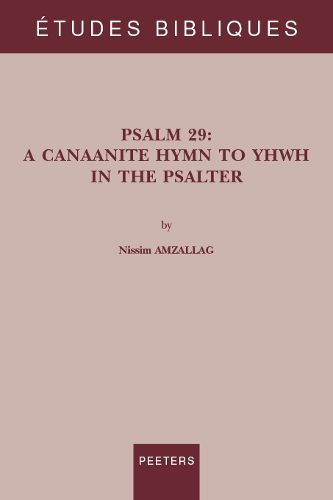Readings Newsletter
Become a Readings Member to make your shopping experience even easier.
Sign in or sign up for free!
You’re not far away from qualifying for FREE standard shipping within Australia
You’ve qualified for FREE standard shipping within Australia
The cart is loading…






Interpreted as praising the divine powers on the storm, Psalm 29 is
currently a cornerstone of the thesis of YHWH’s storm-god identity and
his closeness to the Canaanite Baal. Here, this view is challenged by
considerations about YHWH’s powers on the storm and a reanalysis of
Psalm 29, including a comparative examination of the three possible
expressions of the voice of YHWH (storm, volcanism, and metallurgy); a
whole-psalm analysis of its structure, content and literary
developments; and the meaning of five songs (Psalms 46, 96-98, 114)
conditioned by it. This analysis identifies Psalm 29 as a pre-Israelite,
Qenite song promoting a metallurgical relationship with YHWH, and
praising him as the ‘Lord of mabbul’ (=revitalization).
Its content unveils the Qenite Yahwism and its enduring influence in
Israel. The conditioned psalms express how this song contributed to the
evolution of the Israelite religion, especially the transformation of
YHWH into the ‘Lord of Justice’ in Psalms 96-98 and the Isaiah theology.
$9.00 standard shipping within Australia
FREE standard shipping within Australia for orders over $100.00
Express & International shipping calculated at checkout
Interpreted as praising the divine powers on the storm, Psalm 29 is
currently a cornerstone of the thesis of YHWH’s storm-god identity and
his closeness to the Canaanite Baal. Here, this view is challenged by
considerations about YHWH’s powers on the storm and a reanalysis of
Psalm 29, including a comparative examination of the three possible
expressions of the voice of YHWH (storm, volcanism, and metallurgy); a
whole-psalm analysis of its structure, content and literary
developments; and the meaning of five songs (Psalms 46, 96-98, 114)
conditioned by it. This analysis identifies Psalm 29 as a pre-Israelite,
Qenite song promoting a metallurgical relationship with YHWH, and
praising him as the ‘Lord of mabbul’ (=revitalization).
Its content unveils the Qenite Yahwism and its enduring influence in
Israel. The conditioned psalms express how this song contributed to the
evolution of the Israelite religion, especially the transformation of
YHWH into the ‘Lord of Justice’ in Psalms 96-98 and the Isaiah theology.